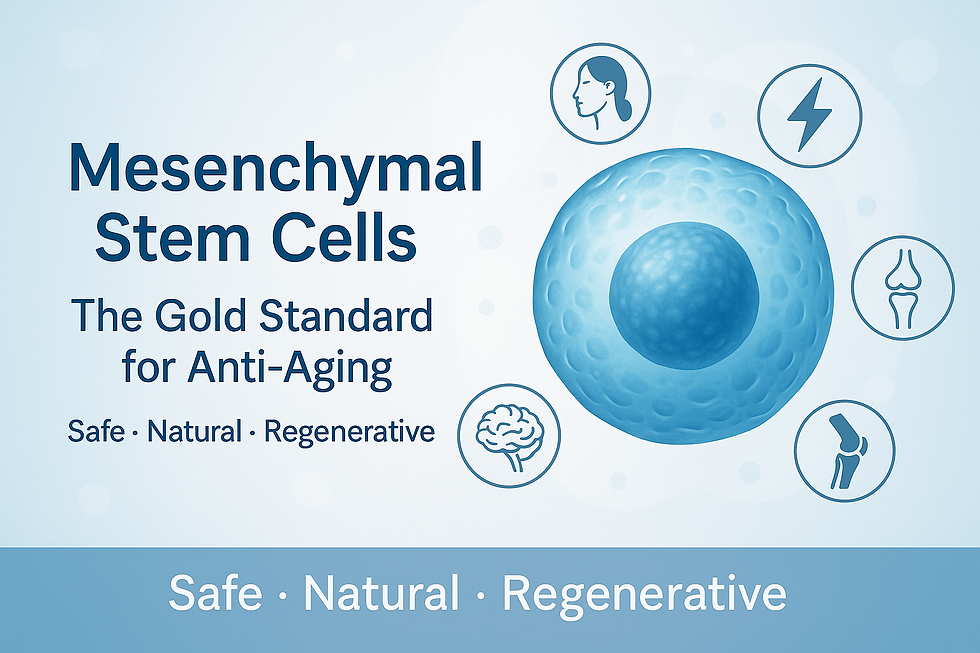Do Stem Cells Cause Cancer or Tumor Growth? Myth vs Fact
- Revival Clinic Team

- Aug 31, 2025
- 4 min read
Stem cell therapy has transformed the landscape of regenerative medicine. With promising applications in anti-aging, joint repair, immune recovery, and chronic disease, it’s no wonder people from across the globe are considering this powerful option. But one question continues to surface:
Do stem cells cause cancer or tumors?
At Revival Clinic Bangkok, we take this concern seriously. While misinformation can cause unnecessary fear, understanding the real science behind stem cell safety is essential. In this article, we explore the truth behind the myth, based on peer-reviewed research and our clinical experience with mesenchymal stem cells (MSCs).
Understanding the Concern: Where Does the Fear Come From?
The fear that stem cells might cause tumors stems primarily from:
Misunderstandings about different stem cell types
Media coverage of early-stage embryonic stem cell research
A lack of public knowledge about clinical-grade stem cell protocols
Some early laboratory studies found that pluripotent stem cells, such as embryonic stem cells (ESCs) and induced pluripotent stem cells (iPSCs), could form teratomas — benign tumors containing multiple tissue types — when injected into animals.
However, these findings do not apply to the mesenchymal stem cells used in clinical practice today.
Myth vs Fact: Mesenchymal Stem Cells and Tumor Risk
Let’s break down the common myth versus the actual science.
Myth:
“All stem cells have the potential to form tumors.”
Fact:
Mesenchymal stem cells (MSCs) — the type used at Revival Clinic — do not form tumors. They are multipotent, not pluripotent, meaning they can only differentiate into a limited range of cell types (e.g., cartilage, bone, fat, skin) and cannot form teratomas.
A systematic review in Stem Cells Translational Medicine (2016) concluded that mesenchymal stem cells “show no evidence of malignant transformation or tumor formation in clinical use.”
Why MSCs Are Safe for Clinical Use
1. Limited Differentiation Potential
MSCs can only become a few types of cells. This makes them biologically safer than ESCs or iPSCs.
2. Immune Modulation Without Overgrowth
MSCs work primarily through cell signaling — they secrete molecules that promote healing, reduce inflammation, and stimulate your body’s repair systems, rather than replicating uncontrollably.
3. Extensive Clinical Evidence
Over 1,000 registered clinical trials have tested MSCs in humans. Across these studies, no cases of tumor formation have been attributed to properly prepared MSCs.
For example, in a 2021 review published in Frontiers in Cell and Developmental Biology, researchers reported MSCs as “safe and well-tolerated with minimal adverse effects” in hundreds of human studies.
The Importance of Source, Quality, and Protocol
Stem cell safety is not just about cell type — it also depends on:
Where the cells come from
How they are processed and tested
How they are administered
At Revival Clinic Bangkok, we use:
Umbilical cord-derived mesenchymal stem cells from healthy, ethically screened donors
Lab-expanded cells processed in sterile, quality-controlled environments
Xeno-free (no animal products), tested for sterility, identity, and viability
Only IV or localized administration — no risky routes like intrathecal injection
Our clinic follows strict safety standards to ensure that our international patients receive care that’s both cutting-edge and evidence-based.
Learn more about our stem cell treatment protocols.
Stem Cells and Cancer Patients: A Different Context
Some people associate stem cells with cancer because of their role in bone marrow transplants for leukemia and lymphoma. However, this is a completely different application involving hematopoietic (blood-forming) stem cells, not mesenchymal stem cells.
That said, MSCs are not recommended for patients with active cancer, not because they cause cancer, but because their immune-modulating effects could interfere with cancer treatment.
We always screen patients thoroughly before offering stem cell therapy.
Summary: Are Stem Cells Safe or Risky?
Concern | Mesenchymal Stem Cell Reality |
Tumor formation | No known risk with MSCs |
Uncontrolled growth | MSCs do not self-replicate beyond therapeutic use |
Cancer risk | Not linked to cancer; not suitable for active cancer |
Clinical evidence | Proven safe in hundreds of studies |
Regulation at Revival Clinic | High standards, certified lab processing |
FAQ
Q: Can stem cells cause cancer later in life?
A: No — mesenchymal stem cells do not cause cancer when used properly. There is no scientific evidence linking MSC therapy to future cancer.
Q: Are there side effects with MSCs?
A: Mild side effects like fatigue, headache, or chills can occur briefly, but serious complications are extremely rare.
Q: What makes Revival Clinic safe for stem cell therapy?
A: We use xeno-free, lab-expanded umbilical cord MSCs, tested and handled under strict quality controls. We serve patients from all over the world with transparency and trust.
Choose Safety. Choose Revival Clinic.
At Revival Clinic Bangkok, we understand your concerns. That’s why we invest in:
Scientific precision
Ethical sourcing
International protocols
If you’re considering stem cell therapy for anti-aging or wellness and want to be sure it’s safe, reliable, and effective, contact us today for a personalized consultation.
References
Lalu, M. M., et al. (2016). Safety of cell therapy with mesenchymal stromal cells: A systematic review and meta-analysis. Stem Cells Translational Medicine, 5(10), 1463–1472. https://doi.org/10.5966/sctm.2015-0287
Bernardo, M. E., & Fibbe, W. E. (2013). Mesenchymal stromal cells: sensors and switchers of inflammation. Cell Stem Cell, 13(4), 392–402. https://doi.org/10.1016/j.stem.2013.09.006
Squillaro, T., Peluso, G., & Galderisi, U. (2016). Clinical trials with mesenchymal stem cells: An update. Cell Transplantation, 25(5), 829–848. https://doi.org/10.3727/096368915X689622
Ullah, M., Liu, D. D., & Thakor, A. S. (2019). Mesenchymal stem cells in regenerative medicine: Focus on articular cartilage and intervertebral disc regeneration. Stem Cells International, 2019. https://doi.org/10.1155/2019/2671898



Comments